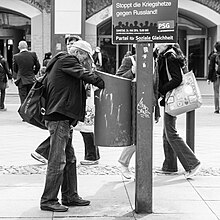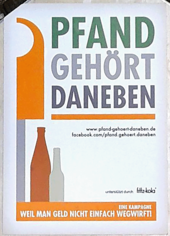Collect bottles
Bottle collecting (actually returnable bottles collecting ) is an occupation of certain groups of people, mostly to improve the private household - income . Only in countries with a similar deposit system as in Germany is there a reason for this activity and its sociological evaluation.
When picking of returnable bottles places are visited where a larger volume of this empties with disposable and reusable deposit is to be expected. The aim of introducing the deposit system on empty drinks packaging was to relieve the environment . Due to the deposit of the most common beverage packaging in 2003 - also for cans and light beverage bottles since 2006 - the amount of this packaging is particularly high in Germany. According to the Federal Environment Agency , almost 96 percent of the bottles went back into the trade in 2012.
sociology
Bottle collectors who specifically pursue the occupation of collecting bottles are a familiar sight in cities in Germany, both when grazing the areas after major events and when rummaging through rubbish bins, for example. B. at train stations . You can also meet them when redeeming large quantities of their found objects at the return machine .
Sociologists have already observed the bottle collectors several times. Sebastian J. Moser recognizes a social figure of his own in the bottle collector , i.e. a time-bound ideal type who throws a certain light on society. In his dissertation in 2014, Moser states that it is not poverty that unites the "otherwise very heterogeneous group of bottle collectors, but the longing for a fixed daily structure and a task that is reminiscent of work". It is also important to them to get around people and not to get lonely, because these people usually have little or no circle of friends. According to his studies, they would come to 100 to 150 euros a month, and another research team would also get three to ten euros a day. In addition to the purely monetary goal, bottle collectors state in interviews that it is for them a hobby or an addiction , or that they are also interested in preserving the environment.
Sociologist Stefan Sell sees insufficient income as the main motivation for collecting bottles. In particular, he notes the sharp increase in low-wage jobs, the disintegration of collective bargaining coverage in many industries and the devaluation of the welfare state model since the early 1990s as reasons for the emergence of this employment. After Attac Germany , which was critical of globalization , bottle collectors have become a symbol of an increasingly poorer society.
In order to understand the phenomenon of bottle collecting, according to the social scientists Catterfeld and Knecht, not only the expected yields of the collectors are decisive. Another prerequisite is that the buyers of the bottles are willing to leave them in public and thus give them to other (more needy) people. This has only been made possible by legislation and its steering effect on behavior. Knecht dates the beginning of this occupation to the major public viewing events as part of the 2006 soccer World Cup , at which collecting, perhaps up to then ashamed, became popular and publicly acceptable.
On average, 80–85 percent of bottle collectors are male and mostly over 65 years old. The second largest group are young immigrants who have not yet gained a foothold in Germany. Most are affected by poverty, but not homeless .
In the DDR
In the GDR , schools and the mass media encouraged the collection of bottles, but also other recyclable materials such as waste paper , glasses or scrap , in order to then redeem them at a SERO collection point, an opportunity for children in particular to top up their pocket money and go on class trips finance. The economy of the GDR was dependent on recycling due to a lack of raw materials and integrated collecting into everyday school and pioneer life . There were regional and temporary collection quotas that had to be met.
See also
literature
- Philipp Catterfeld and Alban Knecht: pledge, consumption and poverty. Why collect bottles? In: collecting bottles. Survival in the City , UVK 2015, ISBN 978-3-86764-624-6 .
- Sebastian J. Moser: Pledge Collector: Exploring an Urban Social Figure. 1st edition. Hamburger Edition, Hamburg 2014, ISBN 3-86854-276-0 , p. 269.
- Alexandra Rau: Everyday collecting bottles: ethnography of an informal work practice . Herbert Utz Verlag, 2016, ISBN 978-3-8316-4323-3
Web links
Individual evidence
- ↑ Kurt Schüler: Volume and recovery of packaging waste in Germany in 2012 . In: Texts , 50/2015, June 2015, Federal Environment Agency .
- ^ Study on deposit collectors. Looking for meaning , Spiegel Online , July 6, 2014.
- ↑ Why people collect bottles (0:28 min) . 3sat , September 27, 2019.
- ↑ a b Bottle collector Male, lonely, over 65 . Deutschlandfunk Kultur , June 1, 2015.
- ^ A b Philipp Catterfeld and Alban Knecht: pledge, consumption and poverty. Why collect bottles? In: collecting bottles. Urban Survival , pp. 169–172.
- ↑ a b c Frederik Rother: Bottle collectors and their everyday life. For a handful of euros. Deutschlandfunk , August 20, 2019.
- ↑ Alexandra Rau: Everyday bottle collecting: Ethnography of an informal work practice . Herbert Utz Verlag, 2016, ISBN 978-3-8316-4323-3 , p. 12 ( google.de [accessed on August 27, 2019]).
- ↑ SERO: On the hunt for old substances. MDR.de , June 5, 2019, accessed on September 16, 2019 .
- ^ Recycling "Made in GDR" - Part 2. In: Wertstoffblog. Retrieved on September 17, 2019 (German).



